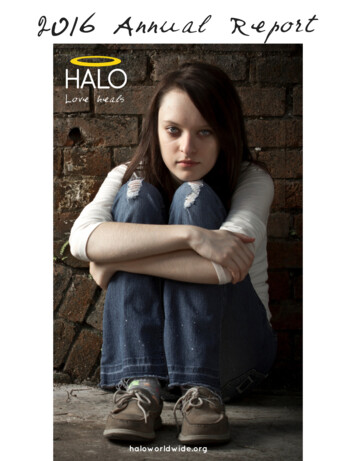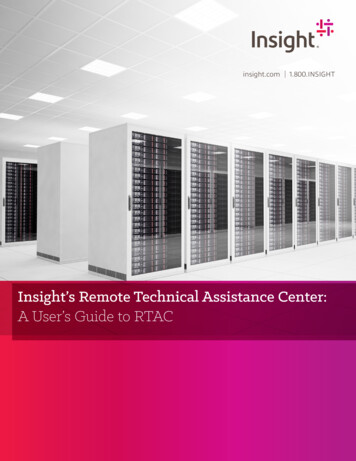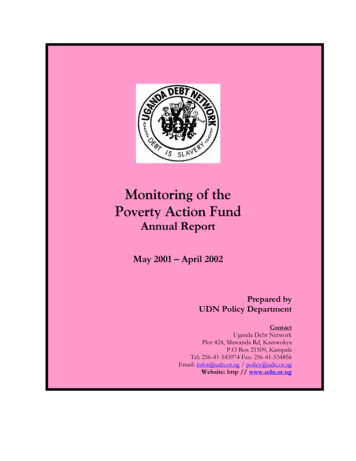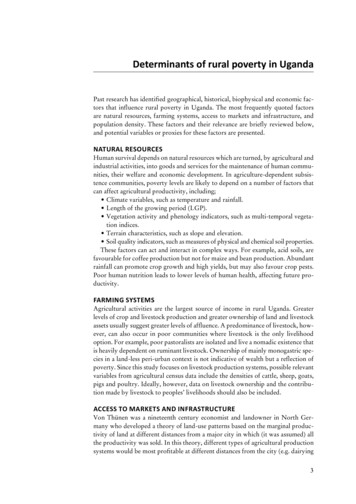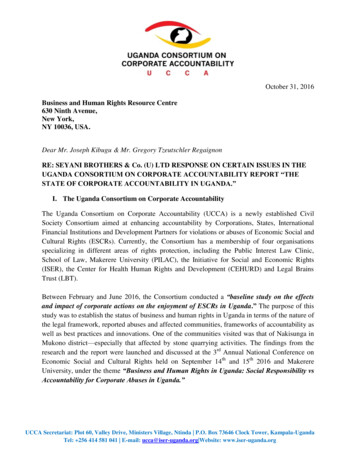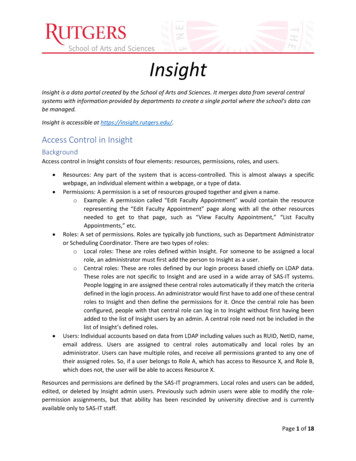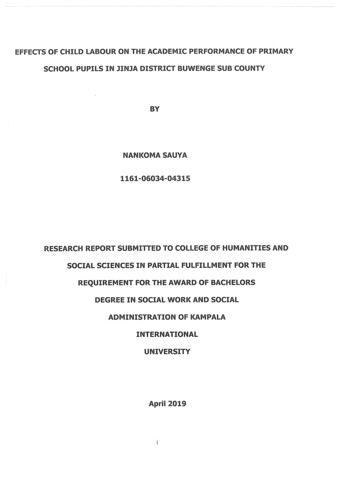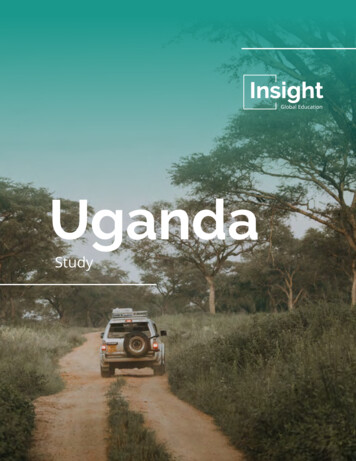
Transcription
UgandaStudy
Introduction/PhilosophyKey components of the Semester inDevelopment Uganda program are theuniversity courses, offered through ourpartner university in Kampala, MakerereUniversity. As a participant in theSemester in Development, you will beenrolled as a student at Makerere, one ofthe top ranked universities in East Africa.Your Makerere registration fees, tuition,course materials and transcripts are allcovered within the SID program cost. Theacademic portion of the SID programallows you to engage with relevant topics,taught by local professors, while earningtransferable upper level course credits.1
The Semester in Development’s academiccomponent emphasizes small class sizes,instruction from local Ugandan professors,as well as curriculum tailored to the programthemes and location.The courses are specifically designed for the SID program, and includeseminar-style discussions and projects that relate to the internshipcomponent of the program. After successful completion of the courses, youwill receive an internationally accredited transcript from Makerere University,ensuring your credits can be transferred back to your home university.Courses through the SID Uganda program are focused on development issuesrelevant to the context, specifically in the areas of international relations,conflict and recovery. While the courses are offered within the university’sSchool of Social Science, the content is designed to be accessible to studentsfrom all academic backgrounds.2
Classes atMakerereUniversityAs a participant in the Semester inDevelopment: Uganda program,you’ll be automatically enrolled in twocourses at Makerere University, locatedin central Kampala. You’ll spend eachFriday on campus at Makerere withyour fellow cohort members.The first week of classes at MakerereUniversity will include an overview ofthe course outlines and assignmentsfor the semester, as well as a quickintroduction to campus. The courseswill include both individual and groupessays and presentations, rather than afinal exam.The two SID Uganda courses offeredby Makerere University are IRS 7206:Africa in International Relations & SSP7111: Conflict, Post-Conflict Recovery andDevelopment.3
Africa in International Relations examines the international relations of Africanstates through the lens of contemporary global politics. It analyzes intra-Africanrelations, interaction of African states with the global system, and the interplayof domestic and external factors in modern Africa. The course seeks to exposestudents to contemporary issues and debates in African politics and internationalrelations. While the course draws examples from sub-Saharan Africa in general,emphasis will be put on examples from Uganda and the Great Lakes Region.The Conflict, Post-Conflict Recovery and Development course seeks to equipstudents with the necessary knowledge, skills and tools used in the conflictanalysis, peace-building and conflict transformation processes aimed at fosteringpost conflict recovery, rehabilitation and development. The course will introducestudents to concepts such as dialogue, reconciliation, equity, justice and coexistence and will engage students in practical exercises such as role plays and/orsimulation exercises.Classes are 2-3 hours in length and are structured as a lecture-seminar hybrid. Theclasses are arranged specifically for Insight participants which means that class sizesare small, and professors get to know you on a first name basis.4
Transportationto CampusMakerere University’s main campus is locatedabout a 20-minute drive from the Insight studenthouse. Most participants travel to Makerere viaboda-boda (motorcycle taxi) or Uber, amounting toabout 1 - 3 each way.5
A dayin the life07:30am8-8:30am09:00am11:30amWake up, shower, make breakfast and getready for school!Start heading to class. The time you leave willbe dependent on your preferred mode oftransportation or during the rainy season inparticular, the weather.You spend the morning attending your firstcourse, Conflict, Post-Conflict Recovery andDevelopment. Today you’re learning abouttwo models of conflict transformation throughsimulation exercises.Lunch time! You spend your quick lunch breakat Makerere’s canteen, conveniently locatednear the Social Sciences building where yourclasses are being held. The canteen has basicsnacking and meal options.6
12:00pm02:30pm07:00pmThe afternoon is spent attendingAfrica in International Relations.Today you’re learning about panAfricanism and regional politics.You head home from campus,and stop by at Acacia Mall for aworkout at the gym upstairs.You join your fellow SID cohortmembers for dinner, followed bylive music and drinks in town tocelebrate the weekend. Weekendsare free for you to plan as you like– you might spend some weekendsrelaxing in Kampala, or if you’refeeling adventurous, you mighttake advantage of all Uganda hasto offer and take a weekend tripout of the city.7
Credit Transfer& TranscriptsEach academic institution has different instructions on how its students canobtain course credits from an overseas institution. It is extremely important thatyou connect with your academic advisor as soon as possible to inquire aboutthe steps you need to take in order to ensure that the courses you will take atMakerere University can transfer back to your home university.For many universities, the typical method for obtaining international coursecredits is through a ‘Letter of Permission’ (LOP). Your academic advisor will beable to provide details of the exact requirements and deadlines for the credittransfer process at your home university. Should you require the Makererecourse outlines as part of your university’s credit transfer process, your SIDProgram Director will send it to you prior to your arrival in Uganda.Following the successful completion of your courses at Makerere, Insight willarrange to have your official transcript sent directly to the relevant office atyour home university. This will take place the week immediately following yourcompletion of the SID program.8
FAQsQ: Will the courses transfer back to my home university?A: We recommend that every student contact their academicadvisor to confirm whether they will be able to transfer creditsfrom Makerere University. We have had students from a rangeof universities across Canada, the US and the UK successfullytransfer the Makerere credits back to their home university.The transfer process is outlined in more detail in the previoussection, titled ‘Credit Transfer & Transcripts’. Please note thatthese are upper level courses, and some universities haveregulations around when upper level courses can be takenduring your university career.Q: Will I study alongside local students?A: Insight’s program schedule does not align with the Ugandanacademic calendar for each semester. This means that ourcourses are set up specifically for the SID program, and willonly include SID participants. However, there are a number ofopportunities to engage with local Makerere students – whetherit be through attending events hosted by the university or byjoining Makerere student clubs.Q: How are the courses graded?A: The Makerere courses offered through the Semester inDevelopment are evaluated through a numerical gradingscheme. The courses do not include exams; instead, gradedassessments take the form of essays, class engagement/participation, and presentations.9
FAQsQ: I’m not an International Development student.Can I still take the classes?A: While the subject matter is focused on developmentrelated issues, the courses are designed to be accessibleto students from a range of academic backgrounds anddisciplines. The Makerere professors are more thanwilling to offer additional assistance if required, andsmall class sizes mean that you’ll be given one-on-oneattention and support.10
Semester in" TheDevelopment mademe really standout to potentialemployers.Thanks to the program, all of my interviews wentreally smooth. Living in Fiji was a big conversationtopic during my interviews. The experience mademe seem like a more interesting and well-roundedperson. I was able to get a job with the company ofmy dreams soon after returning home, and I credita lot of that to my experiences abroad, and myabilities to convey what I did in Fiji. In the last yearsince coming home, I’ve done so many more thingsthat I would have never tried before. I am moreadventurous. I used to say no to things a lot. I nowsay yes to opportunities a lot more than I ever usedto or could have imagined."- Nadine MaierAPPLY NOW11
states through the lens of contemporary global politics. It analyzes intra-African relations, interaction of African states with the global system, and the interplay of domestic and external factors in modern Africa. The course seeks to expose students to contemporary issues and debates in African politics and international relations.
